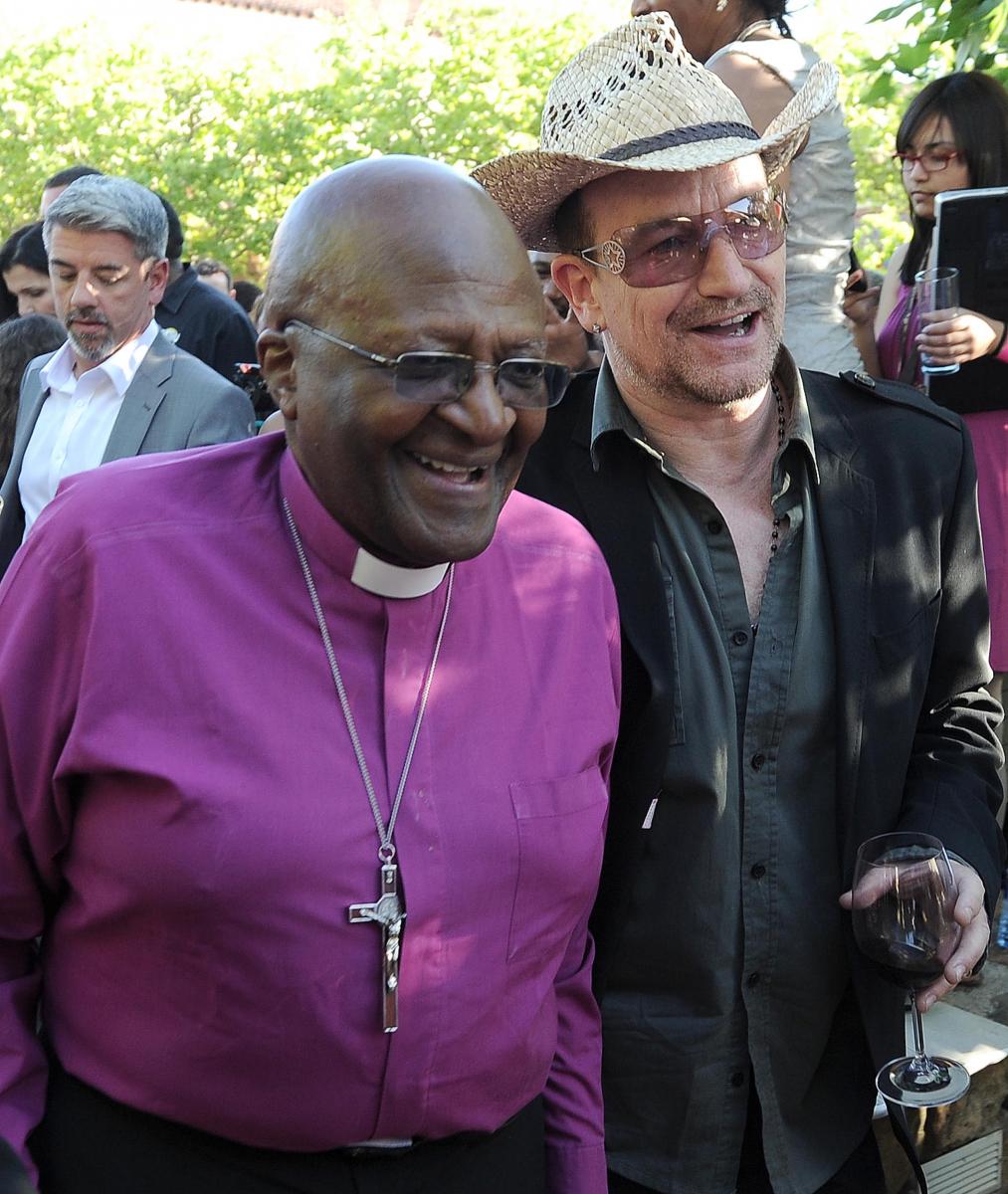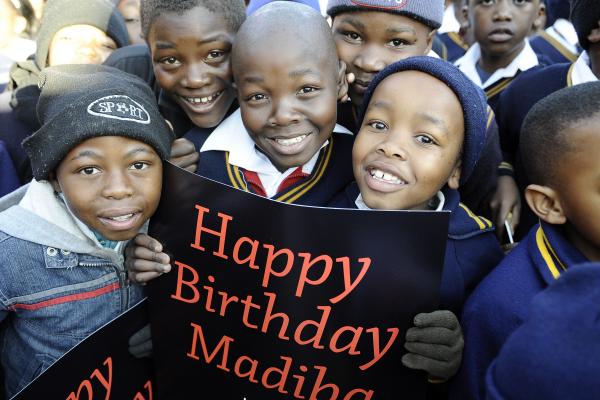Editor's Note: In honor of Mandela Day 2012 and Nelson Mandela's 94th birthday, God's Politics contributor Steve Stockman revisted a reflection from 2005 about South Africa, U2, Ubuntu and grace.
Back in 2005, Africa was a recurring theme of U2's worldwide Vertigo tour, where Bono’s campaigning for debt relief, trade justice and immediate intervention in the AIDS pandemic — each fueled by his following of Jesus — met in his music in indelibly powerful collision of faith, justice, and art.
When Bono and his bandmates played “Where The Streets Have No Name,” the most amazing mass of colors dropped from the rafters as millions of Willie Williams-designed, light bulbs descended from the rafters to form stage’s back drop and a modern-mosaic high-tech screen. Then came the flags of each African nation in the most moving light show I’ve ever seen.
During the razzle-dazzle on stage, Bono made his claim,
“From the swamp lands of Louisiana to the high hills of Kilimanjaro, from the bridge at Selma to the mouth of the Nile…AFRICA…AFRICA…AFRICA…the
journey of equality moves on, moves on…AFRICA…from town centers to townships…sacred ground, proving ground…”
The link between the Martin Luther King Jr. (the Doctor of the Deep South of America’s inequality) to Desmond Tutu and Nelson Mandela (the Archbishop and President of Africa’s inequality) was particularly potent art.
As I watched the show in Vancouver, Canada I found myself in tears when the South African flag appeared on the screen. I had a moment of revelation: I came to believe that the entire thesis of Vertigo had originated in South Africa.
http://youtu.be/HK0Yqc-mFKs
Let me explain by taking you back in time, from Vancouver 2005 to Cape Town in the dry, sunny winter of 2004, where I accompanied 70 university students from Northern Ireland over a period of eight weeks.
No matter where we went there was this word — a recurring mantra — on everyone’s lips.
A township discussion in Guguletu.
A sermon in another township, Masiphumelele.
In the much plusher offices of the vice chair of the Truth and Reconciliation Commission — Alex Boraine — in Claremont.
We were the Northern Irish chaplaincy group wanting to know more about how South Africa had
progressed in the decade after democracy. Most importantly, we wanted to know why the formerly oppressed 80+ percent of the population had not retaliated against their oppressor, but instead managed to woo much of their youth to ride down the rainbow towards a rich eclectic nation of true promise?
The answer to our question was one word: Ubuntu.
When we all got back to our Backpacker after various meetings, we compared notes. What did Ubuntu actually mean? Had we taken down any definitions?
“I can only be me through you.”
“I am me through you.”
“A person is a person through other people.”
“I cannot be fully human without you.”
Indeed, we had gotten the drift and its truth was profoundly powerful.
We had been among a people who believed in the importance of the other person — even their enemies — as being crucial for the authenticity of their complete humanity. Such a people will show unbelievable tolerance, forgiveness, and grace to everyone.
Ubuntu. Yes. And yet, we were still longing for an even more succinct definition.
A few months later, many of the same group of students were home from Cape Town and in the Queens University Chaplaincy in Belfast having a communal first listen to the (then) new U2 album How
To Dismantle An Atomic Bomb.
And there it was. The answer.
Track 6, “All Because Of You I Am.”
Now there's a perfect definition for that Ubuntu thing. In the song, Bono declares, first and foremost, his dependence on God. He says he was born “a child of grace.” He declares his belief that God can make him perfect again.
Yet, in the live context of the Vertigo tour a year later, the song became even more than that. In concert, I firmly believe moved Bono out from his dependence on God to his dependence on those around
him. It could been his wife, Ali, who without a doubt is a big reason that Bono has become who he is.
I believe, though, that it goes much wider than that into his understanding and adoption of Ubuntu.
Several years back, Bono told God’s Politics’ bloggerina Cathleen (when she was a reporter in Chicago) that Tutu had introduced him to the idea of Ubuntu.
Bono said, "Essentially, what it means is 'I am because we are.' And it's about the interdependence, how we need each other and we have a stake in each other. One part of the community can't thrive truly while the other part of the community is in the dirt. In tending to them, we will be better off ourselves. It's that simple. Ubuntu."
Ubuntu has its roots in Xhosa philosophy. Yet, it also is a profoundly biblical concept that challenges the individualistic selfishness of our modern, Western world.
“Love the Lord your God with all your heart,
soul, mind, and strength and love your neighbor as yourself.”
In this, Jesus told us, all the laws of God are kept. This, every Jewish child learned by reciting the Sh’ma, was his purpose in life. Without it the world falls apart as inequality destroys our humanness. In fact Genesis 3 explains that the world did fall apart without it. Humanity’s selfishness threw a world very much one in relationship with God, fellow human beings, the animal kingdom and the earth into disunity.
The Bible’s good news is the story of a God who,
through his son’s life, death and resurrection, restored the possibility of reconciliation in every relationship.
Bono recognized that only when a child dying in a shanty in a South African township is perceived as equal to the child living in a plush house in a wealthy Washington, D.C. suburb, will we make poverty history.
So this biblical idea of interdependence, using Xhosa philosophy as a conduit, is captured in the idea of Ubuntu. It was the secret of how Mandela reconciled his people to the violent criminals of their cruel white oppressors in post-apartheid South Africa. Co-existence was vital, not only to the peace of the nation but to the very identity of his people.
Tutu made Ubuntu the springboard of his thinking and turned it into a theology that the world (still) needs to hear, waken up to, and start living. U2 heard it and continues spreading the word – “All because of you I am.”
Everyone. EVERYONE is crucial to the wholeness of our humanity.
It is the redemption Jesus brought. It is the salvation hope for the world!
Steve Stockman the minister of Fitzroy Presbyterian Church in Belfast, Northern Ireland, and blogs regularly on the intersection of faith and culture at Soul Surmise, where this reflection first appeared.
Image: Photo of Bono with Archbishop Desmond Tutu at the prelate's 80th birthday party in Cape Town, South Africa, Oct. 11, 2011, by Sunday Times/Gallo Images/Getty Images
Got something to say about what you're reading? We value your feedback!
